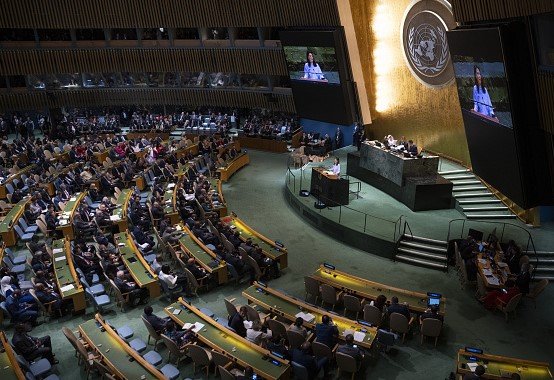Four major Arab countries spoke out against Israel’s ongoing war in Gaza during the United Nations General Assembly in New York on September 28, 2025. Saudi Arabia, Egypt, the United Arab Emirates, and Oman warned that the conflict could lead to a full regional breakdown, urging a quick ceasefire and steps toward Palestinian statehood.
Key Speeches Highlight Growing Anger
Leaders from these nations took the stage at the UN’s yearly meeting, where world tensions run high. Egypt’s Foreign Minister Badr Abdelatty called the situation in the Middle East a ticking time bomb, ready to explode. He blamed Israel’s actions for pushing the area toward chaos and said true peace needs a free Palestinian state.
Saudi Arabia’s Foreign Minister Prince Faisal bin Farhan added his voice, saying the world must act now to stop the violence. He pointed out how the Gaza crisis has caused massive suffering and could spread trouble far beyond the region. Oman and the UAE also joined in, each stressing the need for global pressure on Israel.
These statements came amid fresh clashes, including Israeli strikes in Lebanon that have killed hundreds in recent weeks. The UN meeting happened just days after reports of over 42,000 deaths in Gaza since the war started in October 2023, based on health ministry data.

Demands for Ceasefire and Two-State Solution
The Arab leaders did not hold back on what they want next. They pushed for an end to the fighting right away and real talks for peace. Prince Faisal from Saudi Arabia said ignoring the crisis would harm everyone, not just those in the Middle East.
Egypt’s Abdelatty went further, accusing Israel of blocking aid and rights for Palestinians. He linked the Gaza war to unrest in places like Sudan and Yemen, showing how one problem feeds into others.
Here are some main demands from the speeches:
- Immediate ceasefire to stop civilian deaths.
- Recognition of a Palestinian state by more countries.
- Sanctions on Israel for breaking international rules.
- More aid to Gaza without blocks.
Oman’s Foreign Minister Badr bin Hamad al-Busaidi called for strong steps to make Israel negotiate. He said the world community must step up to end what he described as starvation tactics in Gaza.
The UAE’s Deputy Foreign Minister Lana Nusseibeh focused on building lasting peace. She noted her country’s work in sending aid to Gaza and helping in other global disputes, like prisoner swaps between Russia and Ukraine.
Warnings of Wider Regional Turmoil
These nations warned that the Gaza war could spark bigger fights across the Middle East. Egypt’s top diplomat said the area is at a breaking point, with conflicts in Lebanon and Syria adding fuel to the fire.
Saudi Arabia echoed this, saying failure to act could shake global safety. Recent events back this up, such as Hezbollah’s rocket attacks on Israel and Iran’s involvement in regional tensions. Experts say oil prices have jumped 15 percent in the last month due to fears of wider war, hitting economies worldwide.
Oman pointed to Israel’s moves in other countries as proof of growing threats. The UAE stressed that without a fair deal for Palestinians, no one in the region can feel secure.
To show the scale of the crisis, here’s a table of key facts from recent reports:
| Country | Key Statement | Impact Highlighted |
|---|---|---|
| Egypt | “Mideast at point of implosion” | Links to Sudan, Yemen instability |
| Saudi Arabia | Calls for two-state solution | Warns of global security risks |
| UAE | Urges end to displacement | Notes aid efforts to Gaza |
| Oman | Demands sanctions on Israel | Condemns strikes in Lebanon, Syria |
This table sums up how each nation sees the danger spreading.
Global Reactions and Next Steps
World leaders at the UN listened closely to these warnings. Some countries, like Norway and members of the European Union, have joined Saudi Arabia in pushing for more nations to recognize Palestine. So far, about 150 countries have done so, up from 139 last year.
Israel’s Prime Minister Benjamin Netanyahu defended his country’s actions in his own speech, saying the war aims to end threats from Hamas. But protests outside the UN building showed growing anger, with thousands calling for peace.
Analysts say these Arab statements could lead to new diplomatic pushes. For example, a recent meeting co-hosted by Saudi Arabia and France saw 10 more countries back Palestinian statehood. With the US election coming up in November 2025, some hope for shifts in policy that could help talks.
Why This Matters Now
The Gaza war has dragged on for nearly two years, displacing millions and causing a humanitarian mess. Aid groups report that over 1.9 million people in Gaza need food and shelter, with hospitals overwhelmed. These UN speeches show Arab nations uniting more than before, which could pressure bigger powers to act.
Tying into broader trends, climate issues in the Middle East add to the strain, with water shortages fueling conflicts. Recent data from the World Bank shows economic losses in the region topping $200 billion due to ongoing unrest.
If you found this article helpful in understanding the latest on the Gaza crisis and Middle East tensions, share it with others and drop your thoughts in the comments below. What do you think needs to happen next for peace?
